What is OpenSea NFT Marketplace? - CoinNav.io
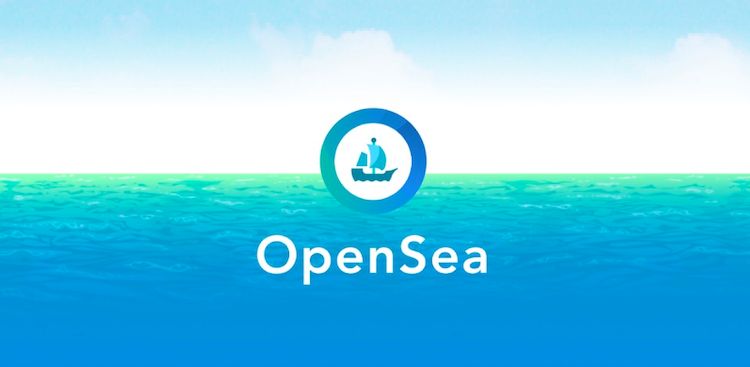 OpenSea stands as a revolutionary decentralized marketplace that has reshaped the landscape of buying and selling NFTs, representing Non-Fungible Tokens. These tokens possess individuality and represent unique digital items, ranging from in-game assets and avatars to trading cards and art pieces.
OpenSea stands as a revolutionary decentralized marketplace that has reshaped the landscape of buying and selling NFTs, representing Non-Fungible Tokens. These tokens possess individuality and represent unique digital items, ranging from in-game assets and avatars to trading cards and art pieces.
Astonishingly, OpenSea’s NFT trading volume in August 2021 surpassed an impressive $3.5 billion mark. This monumental achievement is especially striking when compared to its modest $21 million volume for the entire year of 2020, showcasing an extraordinary surge of 12,000% in trading activity.
Prominent figures in the investment realm, including Mark Cuban, Kevin Durant, Ashton Kutcher, and the influential crypto powerhouse a16z, have collectively contributed to OpenSea’s valuation soaring beyond $1 billion. This meteoric rise has granted the fledgling NFT platform the prestigious “unicorn” status in a remarkably short span of time.
OpenSea garners praise from NFT collectors, artists, investors, and traders alike. However, for those unfamiliar with the platform, its intricacies can be overwhelming. To ease this process, our introductory guide to OpenSea provides a simple yet comprehensive explanation of NFTs, an overview of OpenSea’s functionality, and step-by-step instructions on how to effectively navigate and utilize the platform.
Your Go-To Source for the Latest News and Tools in the Blockchain Sector — Coinnav.io
What are NFTs?
Since the emergence of bitcoin in 2009, the concept of acquiring and possessing assets exclusive to the digital realm has steadily gained familiarity. Utilizing blockchain as its foundation, cryptocurrency presents an avenue for internet-based ownership and value transfer that doesn’t necessarily rely on intermediaries. Intriguingly, NFTs (Non-Fungible Tokens) take this concept further by ushering in novel opportunities centered around the distinctive nature of digital possessions.
While cryptocurrencies like bitcoin and ether are categorized as fungible assets, meaning they are interchangeable, NFTs leverage the capabilities of blockchain technology to introduce digital assets of verifiable singularity and non-interchangeability. In essence, NFTs address the essential non-fungible quality required to seamlessly integrate distinct digital assets and tangible real-world assets onto the blockchain.
An NFT functions as a representation of digital art, in-game items, music, or any other entity necessitating a mechanism for certifying its individuality, scarcity, and ownership validity within the digital domain.
The transfer of NFT ownership can be executed in exchange for digital currencies, circumventing the need for intermediaries. Nonetheless, this process requires interested buyers and sellers to undertake these transactions on a specialized platform designed explicitly for listing, purchasing, and vending NFTs. These dedicated platforms are commonly referred to as NFT marketplaces.
What is OpenSea NFT Marketplace?
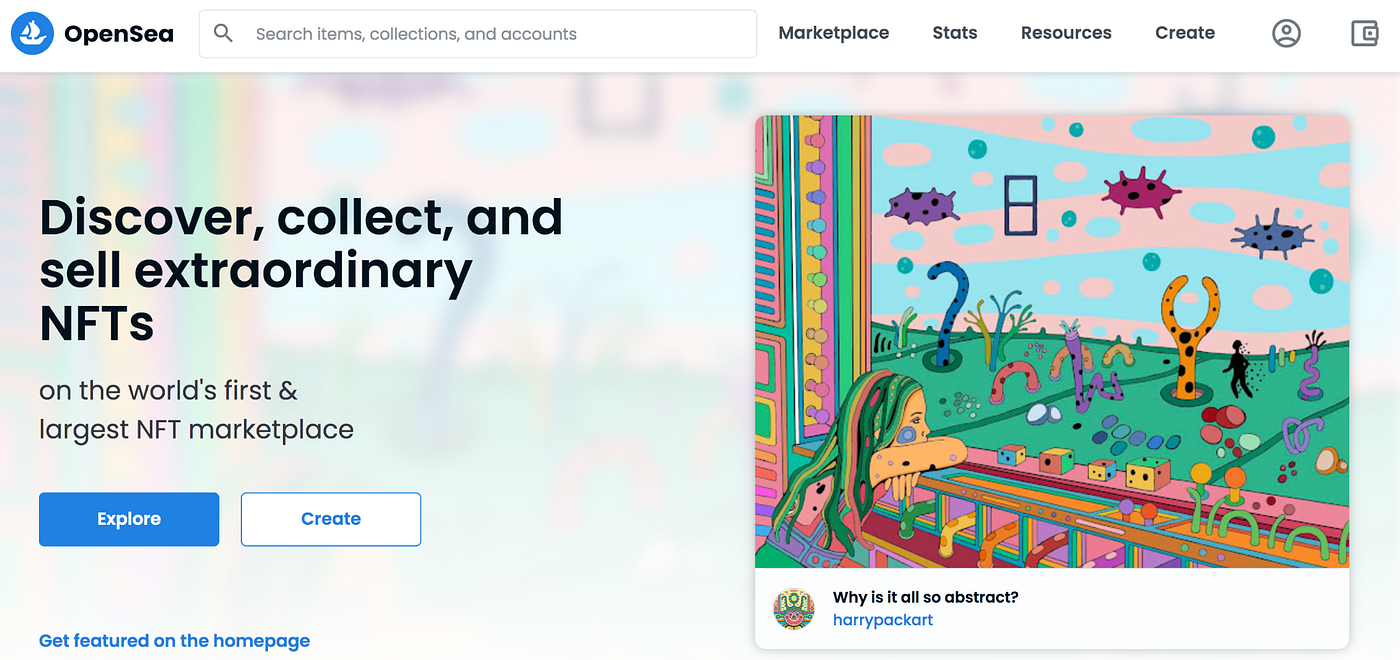 OpenSea proudly asserts itself as the pioneer and largest hub for NFT transactions globally. In simpler terms, you can envision OpenSea as an online marketplace similar to eBay, tailored for digital artifacts and collectibles.
OpenSea proudly asserts itself as the pioneer and largest hub for NFT transactions globally. In simpler terms, you can envision OpenSea as an online marketplace similar to eBay, tailored for digital artifacts and collectibles.
Back in 2017, within the vibrant setting of New York City, Alex Atallah and Devin Finzer laid the foundation for OpenSea. Swiftly, they steered their venture into the renowned Y Combinator startup accelerator, securing a substantial backing of $2.7 million.
During its early stages, the OpenSea team faced an intriguing challenge. Prior to 2021, the NFT realm had yet to gain substantial traction, with fleeting trends like CryptoKitties being notable exceptions. However, the OpenSea team’s foresight, where digital items would soon hold comparable, if not greater, value than their physical counterparts, began to unfold as a remarkable reality. To better grasp the essence of OpenSea, a bit of historical context can be illuminating.
The burgeoning NFT surge draws from the early patterns of cryptocurrency token trading. On a global scale, individuals are constantly engaging in the exchange of digital currencies and utility tokens. The comfort exhibited in owning intangible assets, coupled with the acceptance of the digital-native era, unequivocally marks its arrival. magic#boi NFT by LIRONA
magic#boi NFT by LIRONA
Engaging with virtual elements has evolved into a regular occurrence as individuals progressively embrace an online existence. While the initial era of the internet witnessed efforts to translate the physical world into the digital realm, the present stage is characterized by the dominance of creations that are conceived in the digital realm from their inception. Notable examples include impactful memes, immersive games, and interactive digital experiences.
This shift in focus is also reflected in the realm of social media, where the conventional trend of using selfies as profile pictures is undergoing transformation. Platforms like Instagram, Twitter, and TikTok are witnessing a departure from traditional self-portraits. Instead, animated avatars portraying characters like penguins, stylized pixel art characters, and even satirical apes donning laser-fitted eyes are asserting their presence and capturing the spotlight.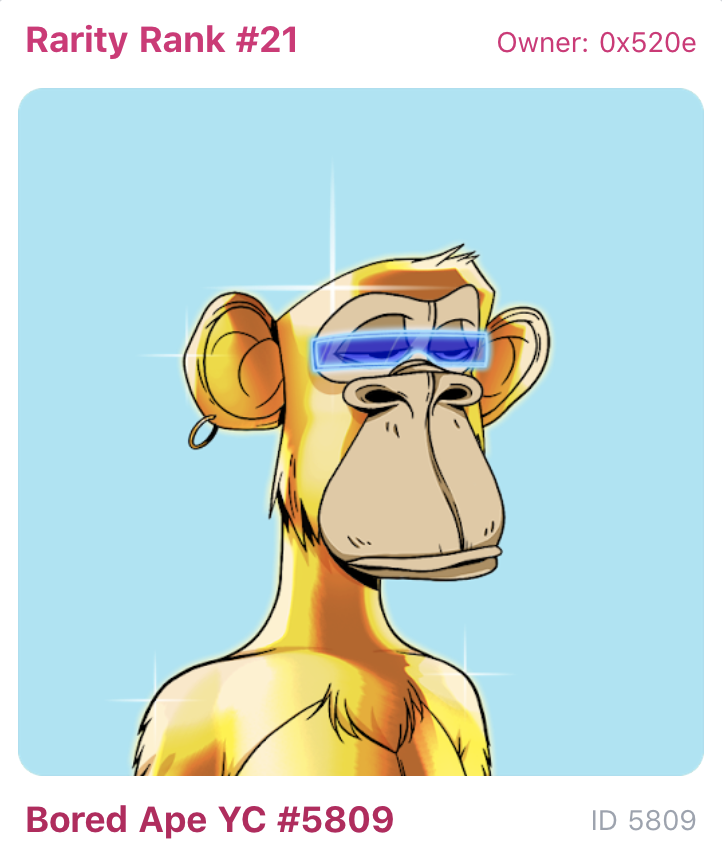 Bored Ape NFT #5809
Bored Ape NFT #5809
Viewed from a broader perspective, these various indicators converge to signify the dawn of the metaverse — an expansive virtual realm that we collectively shape and possess, with NFTs emerging as a pivotal component within it. Hence, while it may be tempting to liken OpenSea to a digital object equivalent of eBay, its essence stretches far beyond that comparison.
When you acquire an NFT, it enters your possession akin to the way groceries become your belongings post-payment. However, ponder the scenarios when you wish to initiate a transfer, execute a sale, or explore similar items. Consider the instance when you’re on the verge of purchasing an NFT and desire swift access to its ownership lineage.
In the era preceding OpenSea, none of these tasks had straightforward solutions. True, OpenSea operates as a peer-to-peer NFT marketplace; however, it takes on an additional role as the interface that bridges the gap between the blockchain and everyday consumers. This strategic positioning ensures that NFTs are rendered accessible and purchasable for anyone, thus simplifying what once were complex transactions.
Features of the OpenSea NFT Marketplace
The OpenSea platform offers a diverse array of functionalities that cater to various needs. While the common actions involve trading, purchasing, and selling NFTs of different types, the platform goes beyond these basics to provide users with valuable insights into the NFT market and updates on new projects.
Seamless NFT Creation and Collection Setup
Creating NFTs on OpenSea is a user-friendly process that requires no prior expertise. The initial step involves establishing your unique NFT collection. Once this foundation is laid, you can proceed to upload NFTs in formats that are compliant with the platform’s requirements.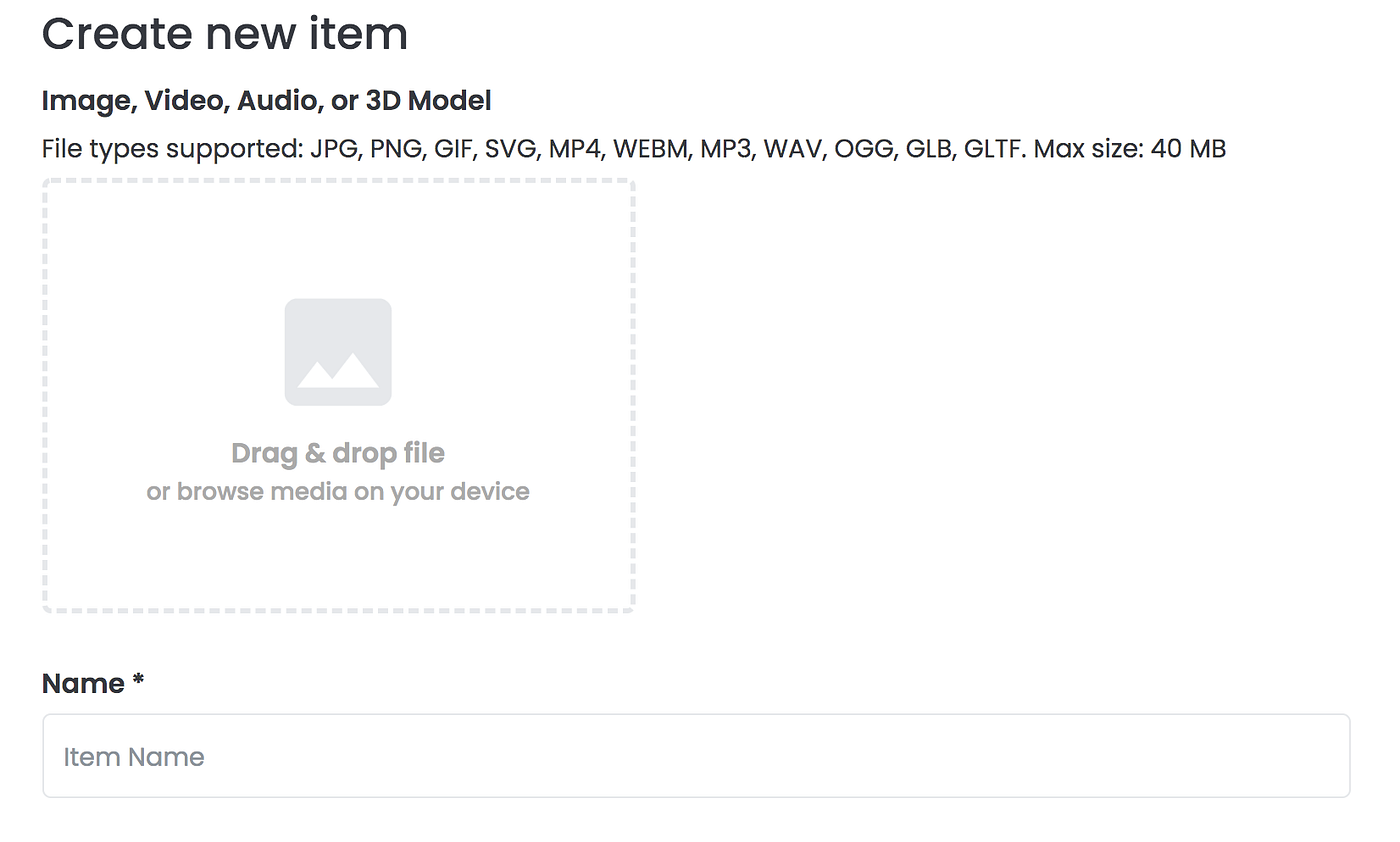 Furthermore, it’s recommended to furnish your NFT project with pertinent details, such as links to associated social media profiles like Twitter or Telegram, especially if you intend to engage with the public.
Furthermore, it’s recommended to furnish your NFT project with pertinent details, such as links to associated social media profiles like Twitter or Telegram, especially if you intend to engage with the public.
Comprehensive Support for Diverse NFT Types
NFTs hold the potential to symbolize a wide range of objects, spanning both physical and digital realms, all recorded on the blockchain. OpenSea conveniently organizes this extensive landscape by categorizing NFTs into various segments that encompass the most sought-after types.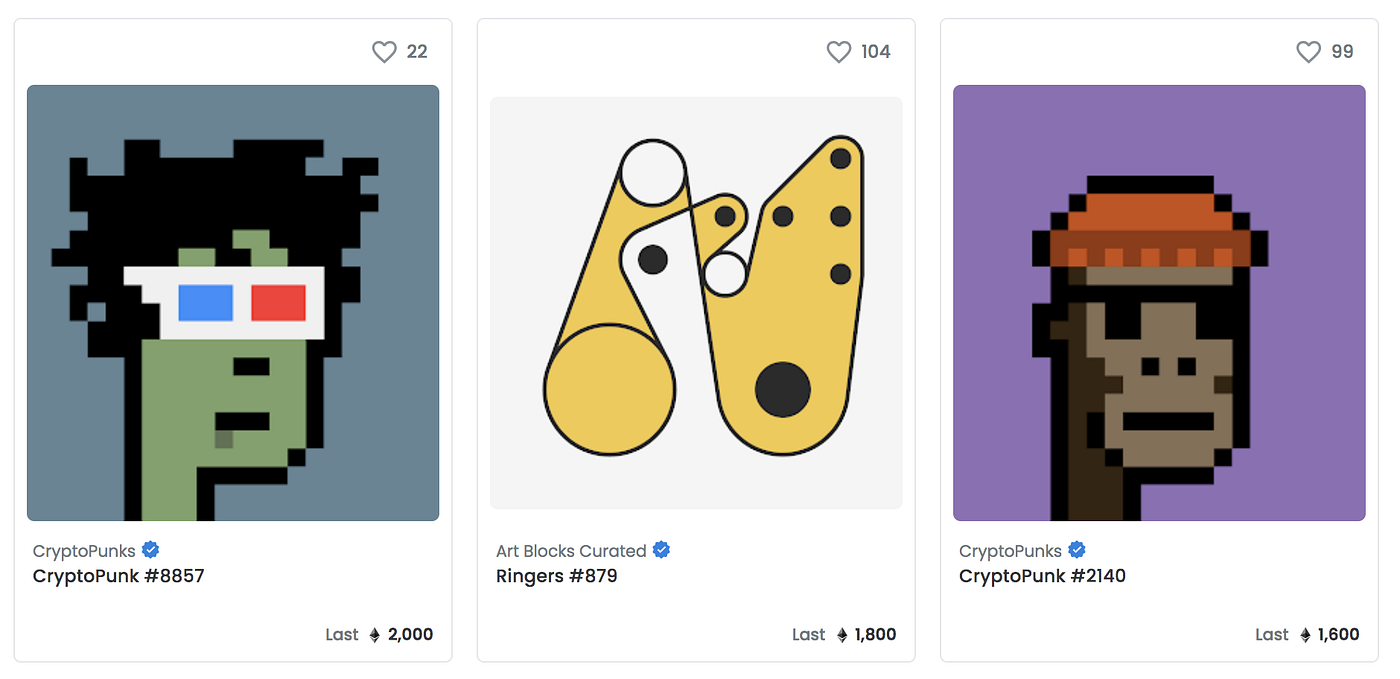 These encompass art, music, domain names, virtual environments, trading cards, collectibles, sports assets, and utility-focused NFTs like membership passes.
These encompass art, music, domain names, virtual environments, trading cards, collectibles, sports assets, and utility-focused NFTs like membership passes.
NFT Marketplaces Catering to Consumers and Developers
OpenSea has emerged as the premier destination for NFTs, boasting an unparalleled selection available for purchase. This has solidified its standing as the go-to marketplace for everyday users seeking to acquire NFTs and an indispensable platform for developers as well.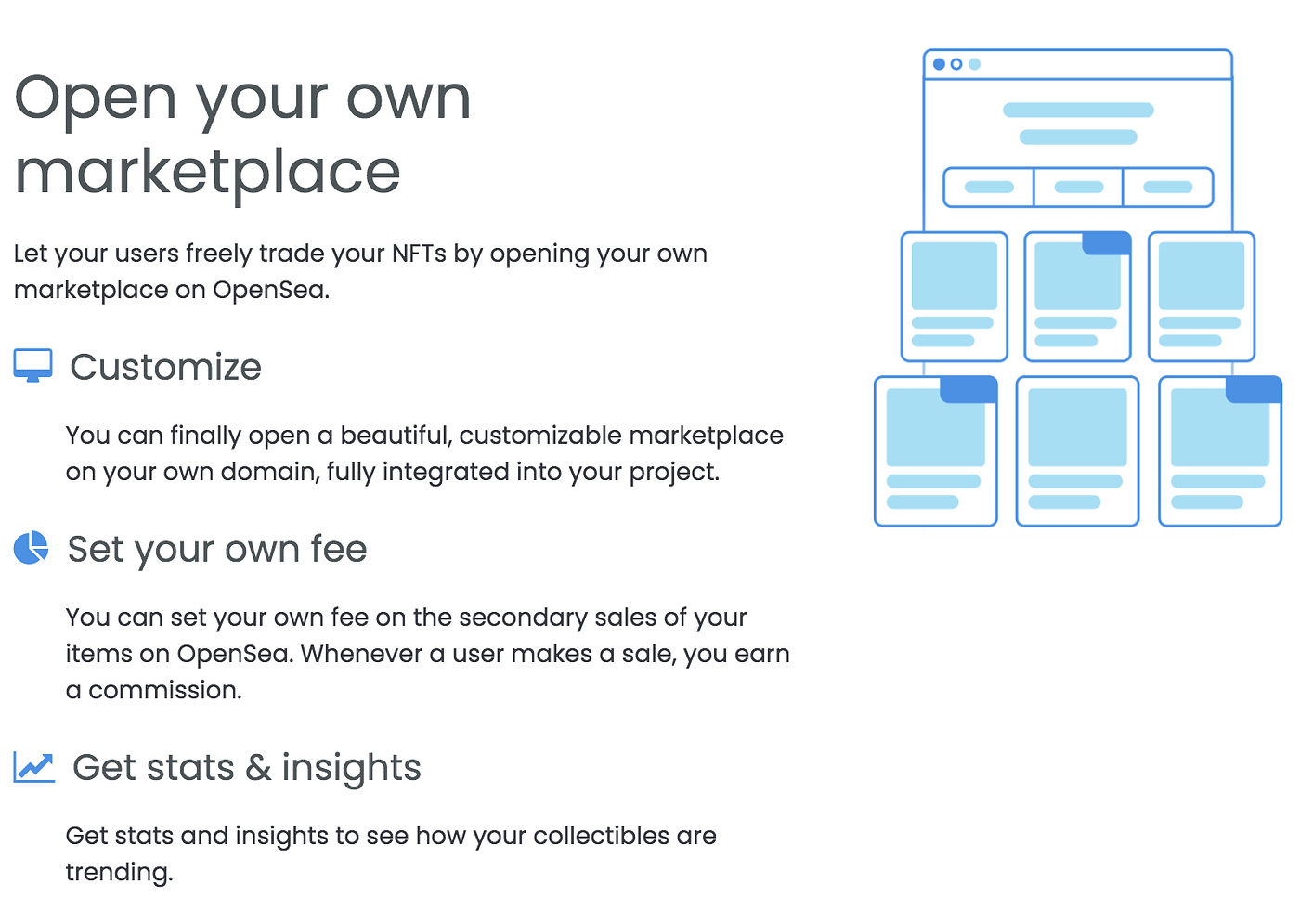 Developers can seamlessly create bespoke NFT marketplaces on OpenSea, facilitating the sale of in-game items, the initiation of crowdfunding campaigns, distribution of airdrops to users, and a host of other innovative possibilities.
Developers can seamlessly create bespoke NFT marketplaces on OpenSea, facilitating the sale of in-game items, the initiation of crowdfunding campaigns, distribution of airdrops to users, and a host of other innovative possibilities.
Wide-Ranging Multichain Support, Including Ethereum and Polygon
Ethereum remains the cornerstone of the NFT world, akin to its significance in decentralized finance endeavors. However, Ethereum’s limitations in terms of scalability have translated into challenges, particularly evident in the high gas fees accompanying NFT transactions.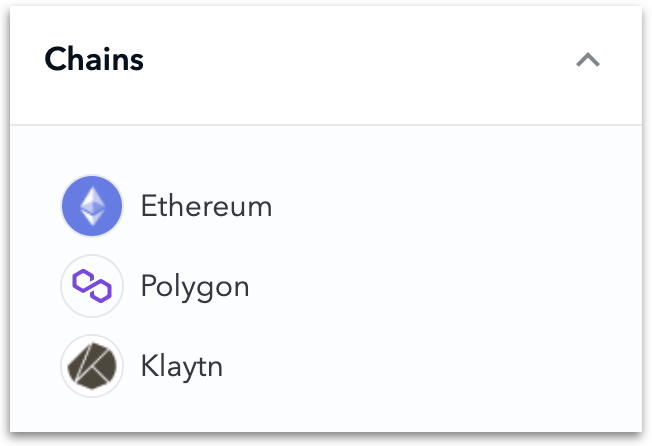 OpenSea has adeptly addressed this by integrating with Polygon, a blockchain solution that enhances the speed and affordability of Ethereum tokens, NFTs included. Ethereum’s co-founder, Vitalik Buterin, has even endorsed the migration of NFT tokens to Polygon to mitigate these issues.
OpenSea has adeptly addressed this by integrating with Polygon, a blockchain solution that enhances the speed and affordability of Ethereum tokens, NFTs included. Ethereum’s co-founder, Vitalik Buterin, has even endorsed the migration of NFT tokens to Polygon to mitigate these issues.
Navigating between the Ethereum and Polygon networks on OpenSea is remarkably straightforward, requiring just a simple click. This user-centric feature serves as a welcoming touch, particularly for newcomers to the world of NFTs and blockchain technology.
NFT Metrics and Analysis
In the realm of cryptocurrencies, the NFT market stands as a comparatively recent addition alongside decentralized finance and various other sectors. However, seeking out comprehensive statistics and analytical insights pertaining to individual NFTs and broader trends within the NFT space can prove to be a daunting task without proper guidance.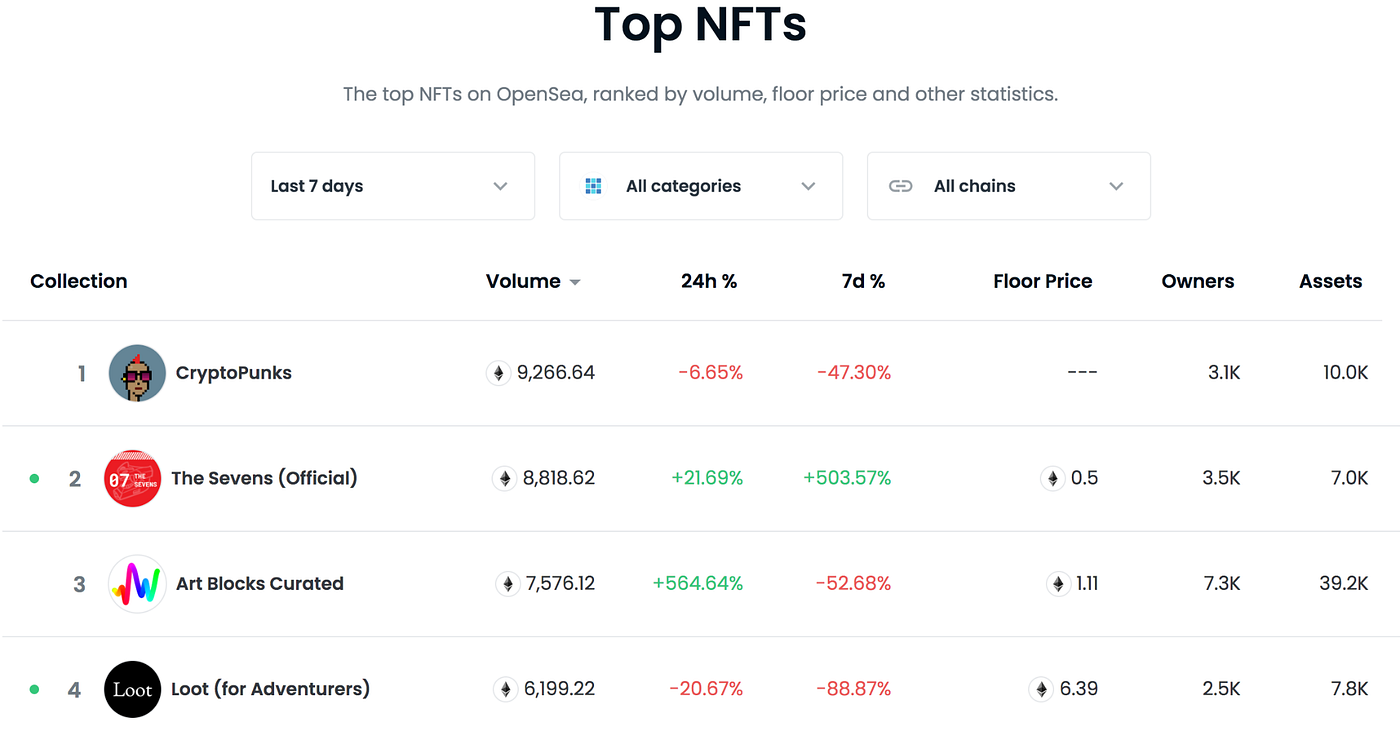 OpenSea has notably streamlined this intricate process by aggregating its marketplace data, presenting a user-friendly solution for all to explore. This data is conveniently organized, allowing users to categorize it based on rankings determined by sales volume as well as recent activity, thereby facilitating a more insightful understanding of the dynamic NFT landscape.
OpenSea has notably streamlined this intricate process by aggregating its marketplace data, presenting a user-friendly solution for all to explore. This data is conveniently organized, allowing users to categorize it based on rankings determined by sales volume as well as recent activity, thereby facilitating a more insightful understanding of the dynamic NFT landscape.
OpenSea’s Fee Structure is Cost-Effective
Here’s the scoop: OpenSea offers its NFT marketplace infrastructure without any charges, and the operational costs of the platform are sustained by a modest 2.5% fee levied on each NFT transaction.
When you put it side by side with eBay’s fees, which kick off at 10% and can escalate further, OpenSea’s consistent, flat-rate sales fee emerges as a truly sensible choice. It doesn’t matter if your NFT is valued at $10 or an astounding $10,000,000; the fee paid to OpenSea remains uniform across the board.
What currencies does OpenSea accept for buying NFTs?
OpenSea facilitates transactions with a variety of cryptocurrencies, encompassing:
- Ether (ETH) — As the inherent digital currency of the Ethereum blockchain, Ether stands as the prevailing choice for acquiring and vending NFTs across the OpenSea platform.
- Dai (DAI) — Recognized as a stablecoin, Dai’s value is pegged to that of the U.S. dollar, ensuring a lesser degree of volatility compared to other cryptocurrencies.
- Wrapped Ether (WETH) — Functioning as a representation of Ether on the Ethereum blockchain, WETH serves as a medium for Ether trading on decentralized exchanges and functions as a valid means for purchasing NFTs on OpenSea.
- Other cryptocurrencies, encompassing Bitcoin (BTC), USDC, and additional options.
It’s prudent to acknowledge that prospective buyers must possess a digital wallet compatible with the specific cryptocurrency they intend to employ for NFT acquisitions on OpenSea. Furthermore, NFT prices frequently correlate with cryptocurrency valuations, necessitating buyers to be attentive to exchange rates when initiating transactions.
What wallets does OpenSea support?
OpenSea offers extensive support for a diverse array of digital wallets harmonious with the Ethereum blockchain. Among the wallets supported are:
- MetaMask: A widely used browser extension empowering users to seamlessly interact with the Ethereum blockchain and oversee their digital assets.
- MyEtherWallet: An online-based wallet granting users the ability to securely store, administer, and transfer both Ethereum and Ethereum-based tokens.
- WalletConnect: A mobile wallet application facilitating users in engaging with decentralized applications within the Ethereum blockchain environment.
- Coinbase Wallet: A mobile wallet app catering to Ethereum and Ethereum-based tokens, ensuring users can conveniently manage their holdings.
- Trust Wallet: A versatile mobile wallet app enabling users to oversee various cryptocurrencies, including Ethereum and Ethereum-based tokens.
- Ledger: A hardware wallet engineered to provide a fortified storage and management solution for an assortment of cryptocurrencies.
- Trezor: Another hardware wallet option, designed to deliver a safeguarded storage mechanism for a multitude of cryptocurrencies.
These representations are merely a glimpse of the compatible wallets that integrate seamlessly with OpenSea. As long as a chosen wallet extends support to the Ethereum blockchain, it is poised to be compatible and functional with the OpenSea platform.
What NFTs does OpenSea support?
OpenSea has been meticulously crafted to exhibit flexibility and adaptability, making it a suitable platform for an extensive array of digital assets rooted in the Ethereum blockchain.
OpenSea proudly endorses and accommodates numerous popular categories of NFTs, which encompass:
- Artistic Creations: Renowned for its vast repository of digital art NFTs, OpenSea offers an eclectic assortment that spans from 2D artworks and animations to intricate 3D sculptures and immersive installations.
- Collectible Items: OpenSea also warmly embraces collectibles as a sought-after category, encompassing a wide range of items such as trading cards, in-game paraphernalia, and distinctive digital artifacts.
- Virtual Land Holdings: The platform serves as a vibrant marketplace for the trading of virtual real estate, an arena that encompasses virtual land within blockchain-based games and expansive virtual universes.
- Sonic and Auditory Expressions: OpenSea extends its support to NFTs embodying musical compositions and audio recordings. This includes limited-edition albums and exclusive sonic experiences that resonate with enthusiasts.
- Digital Domains: Among its offerings, OpenSea extends compatibility to NFTs representing domain names registered on the Ethereum Name Service (ENS), enriching the scope of possibilities.
The mentioned categories merely scratch the surface of the diverse NFT landscape that OpenSea embraces and accommodates with open arms.
How to start using OpenSea?
Embarking on your OpenSea journey entails a series of steps that you can follow below:
- Set Up Your Digital Wallet: The first step involves creating a digital wallet that is compatible with the Ethereum blockchain. This will enable you to engage in buying and selling NFTs on the OpenSea platform. Popular digital wallets that seamlessly integrate with OpenSea include MetaMask, MyEtherWallet, and Trust Wallet.
- Fuel Your Wallet: Once your digital wallet is in place, you’ll need to fund it with cryptocurrency. This cryptocurrency will serve as the means to acquire NFTs on OpenSea. Ether (ETH) stands as the most prevalent cryptocurrency for NFT transactions on the platform.
- Explore NFT Offerings: Delve into the array of NFTs available on OpenSea by navigating to the website. Utilize the search functionality to pinpoint specific items or venture through various categories to discover intriguing selections.
- Secure NFT Purchases: Upon discovering an NFT that captures your interest, your digital wallet becomes your gateway to procuring it. You can either place a bid or directly purchase the item if it’s available for immediate sale. Once the transaction concludes, ownership of the NFT transfers to your digital wallet.
- Facilitate NFT Sales: Should you possess an NFT that you’re keen on selling through OpenSea, the process is equally straightforward. You can establish a listing for the item and specify a fixed price or opt to accept bids. Following a successful sale, the earnings from the transaction, minus any associated fees, will seamlessly transfer to your digital wallet.
While these represent the foundational steps for navigating OpenSea, it’s worth noting that the intricacies may extend further based on the unique NFTs you’re engaging with. Aspects such as gas fees and transaction thresholds might necessitate your attention, enhancing your overall experience on the platform.
Advantages of OpenSea
OpenSea presents an accessible and user-centric platform tailored for the trading of NFTs. Its key advantages encompass:
- Diverse Array: Counted among the largest NFT marketplaces globally, OpenSea boasts an extensive spectrum of NFTs available for transaction. This equips buyers with an expansive assortment of options, while sellers can effectively tap into a vast pool of potential purchasers.
- User-Centric Design: OpenSea’s website embodies simplicity and ease of navigation, accentuated by an intuitive interface that simplifies the processes of NFT exploration, acquisition, and vending.
- Economical Transaction Costs: OpenSea boasts nominal transaction fees in relation to NFT buying and selling, particularly when contrasted with some alternate NFT marketplaces. This positions it as a cost-efficient choice for both transacting parties, amplifying its appeal.
- Multi-Wallet Compatibility: OpenSea seamlessly interfaces with a plethora of digital wallets, encompassing popular options such as MetaMask, MyEtherWallet, and Trust Wallet. This seamless compatibility facilitates user access and transaction execution through their preferred wallet. Community-Centric Attributes: OpenSea augments its utility through diverse community-focused features, including creator profiles, NFT collections, and integration with social media platforms. These functionalities empower creators to showcase their creations and foster connections with potential patrons, enabling buyers to track favored creators and remain abreast of novel releases.
Disadvantages of OpenSea
While OpenSea undoubtedly presents numerous benefits, it is important to also consider potential drawbacks:
- Intense Competition: As one of the premier NFT marketplaces, OpenSea naturally operates in a fiercely competitive environment. This dynamic can pose a challenge for emerging creators seeking visibility and for buyers aiming to discover distinctive or undervalued NFTs amidst the vast array of listings.
- Curatorial Constraints: OpenSea adopts an open-door approach, enabling anyone to list their NFTs for sale. This inclusivity, however, can lead to a lack of meticulous curation or quality control. Consequently, buyers might need to invest additional effort in researching and conducting due diligence to ensure the authenticity and value of their NFT purchases.
- Unpredictable Volatility: Similar to all crypto-centric assets, NFT values are susceptible to extreme volatility, characterized by rapid and unforeseeable price fluctuations. This inherent instability can complicate the process of determining equitable prices for both buyers and sellers, potentially leading to unexpected financial gains or losses.
- Technical Intricacies: Utilizing OpenSea necessitates a certain level of familiarity with concepts like digital wallets, blockchain technology, and cryptocurrency transactions. This requirement can present a barrier to entry for individuals unacquainted with these intricate technologies.
Security Concerns at OpenSea
Similar to many online marketplaces, OpenSea encounters its share of potential security concerns. Nevertheless, the platform’s robust security protocols and unwavering dedication to continuous vigilance and enhancement establish it as a notably safe and secure arena for NFT transactions.
OpenSea employs a safeguarding approach by employing secure, decentralized storage mechanisms for all NFTs featured on its platform. This framework ensures the impervious storage of NFTs, rendering them impervious to tampering or theft.
Prior to engaging in any NFT transactions, users are mandated to authenticate their digital wallets and validate their identity. This proactive step acts as a potent deterrent against fraudulent activities and reinforces the protection of user profiles.
As an added layer of defense for user accounts, OpenSea provides the option of two-factor authentication (2FA). This entails users entering a code generated by an authentication app in conjunction with their password during the login process.
In a bid to fortify its defenses, OpenSea offers a program of bug bounties. This incentivizes security researchers to uncover and report any potential vulnerabilities residing within the platform’s coding or infrastructure. The prompt identification and resolution of these potential weak points serve to preempt any prospective security lapses.
Importantly, OpenSea undertakes the ongoing surveillance of its platform to swiftly detect and respond to any indicators of unusual or suspicious activities. This proactive stance further solidifies the platform’s commitment to upholding security and safeguarding user experiences.
Final thoughts
OpenSea stands out as an esteemed and extensively utilized platform dedicated to the trading of NFTs. For newcomers venturing into the realm of NFTs, OpenSea offers a promising entry point, boasting an extensive collection of NFTs available for purchase, user-friendly functionalities, and a vibrant and engaged community.
Nevertheless, it’s imperative to align your specific requirements and aspirations with your choice of NFT marketplace. When engaging in NFT investments, a cautious approach and well-informed decision-making are paramount.
In the larger scheme of things, OpenSea maintains an unwavering commitment to ongoing enhancement and innovative strides within the NFT landscape. This dedication positions it favorably to retain its role as a pioneering platform for the buying and selling of NFTs in the years that lie ahead.

![[ℕ𝕖𝕧𝕖𝕣] 𝕊𝕖𝕝𝕝 𝕐𝕠𝕦𝕣 𝔹𝕚𝕥𝕔𝕠𝕚𝕟 - OM(G) , My Biggest Bag Was A Scam????](https://cdn.bulbapp.io/frontend/images/99de9393-38a8-4e51-a7ab-a2b2c28785bd/1)








































